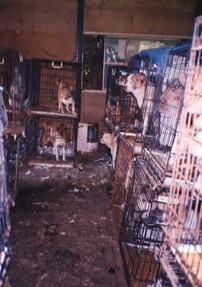
Pet Store Puppies and Puppy Mills
by Marti
Buy a pet store puppy and you support puppy mills, commercial breeding operations where parent dogs spend their lives in cages, often without proper food, shelter, or vet care.
A Dog's Life in a Puppy Mill
A Living Nightmare
 Every day is the same: the same cage with room to only sit, stand, lie down, stare through wire, jump on wire, longing to get out. There's barely room to turn around. Flies and mosquitos buzz and bite.
Every day is the same: the same cage with room to only sit, stand, lie down, stare through wire, jump on wire, longing to get out. There's barely room to turn around. Flies and mosquitos buzz and bite.
For many, there's suffocating heat in summer and bone chilling cold in winter, only dim light or darkness, and wire pressing into foot pads and skin. There's matted hair and festering sores.
There are no kind words, no love, no treats, no walks, no running on grass, no soft beds. Nothing breaks the monotony of confinement, discomfort, pain.
The main thing is to make puppies. One litter after another with no break, puppies, puppies, and more puppies, because that's what some people want -- to buy puppies -- and the puppies make money for the breeders, the pet shops, and even the AKC since it registers these dogs.
In essence, that's the life of breeder dogs in a puppy mill, a commercial dog breeding facility, the equivalent of factory farming. The dogs are treated as a commodity, not as pets, companions, or sentient creatures. Usually, when they are too old or too worn out to produce puppies, the breeder dogs are killed.

It's true that some mills are cleaner than others and some provide more care than others. One mill owner, for example, put in "wheels" like those used by hamsters for his dogs, pointing out that through these his dogs do get exercise.
But even if clean, the fact remains that the dogs spend their entire lives in cages. Imagine yourself waking, spending the entire day, and sleeping in a cage every day, every week, year after year. I'm sure dogs go insane in these conditions.
In the states of Ohio and Pennsylvania, the Amish are the main puppy millers. At these mills, and at many other mills, the dogs most likely live in dim, drafty barns, suffering in heat and cold.
At worst, and in spite of USDA regulations, cages will be stacked one atop another, with urine and feces dripping through the wire into the cages and onto the dogs below. Sores develop. Muscles atrophy. There are documented accounts of dogs getting their legs stuck in the wire of a cage, and of that leg being cut off -- either because it was easier and cheaper than cutting up a cage, or because the leg had become infected and wasn't going to be treated anyway. Three legged dogs, if they live, can still breed, after all.
The video at the end of this page is hard to watch, but it very clearly shows, more than words alone ever could , that puppy mills are a dog's nightmare, one from which only a relatively few ever awake.
Yes, (Some) Mills are Regulated
But Is the USDA Doing Its Job?
The USDA is in charge of inspecting "wholesale" dog breeding operations -- those that breed dogs to sell wholesale to pet shops -- to make sure they comply with the Animal Welfare Act (AWA). Some states, but not all, also have mill regulations in place. So this should insure that mill dogs are properly cared for, correct?
The minimum standards are just that -- MINIMUM. The AWA requires, for example, that animals kept outside have "shelter," and that animals regularly receive food and clean water. Cages are required to be just 6 inches wider, longer, and taller than the dog in the cage. Could you live with just 6 inches of space around you?
Next, the USDA does not have the funds for the number of inspectors needed to consistently check mill conditions.
The Humane Society of the United States, ASPCA, and other organizations also note that regulations are poorly enforced, with repeat violators allowed to remain in business. Fines, if they are given, are minimal.
Furthermore, mills and "back yard breeders" if they sell directly to the public -- over the internet, through newspaper ads, at flea markets and other such venues -- are not required to be licensed and inspected by the USDA. Unless state laws intervene (and again, many, if not most, states have no laws regulating breeders) no one checks these breeders to see what conditions the dogs are kept in.

This is a dog that was used for breeding at a mill. Fortunately, this one was saved.
Puppy Mill and Back Yard Breeder Busts
Yes, We Do Read About Mill Raids and Confiscated Dogs
So how is it that some puppy mills are shut down?
Some mills are shut down because states do have anti-cruelty laws, though these vary from state to state. The problem is bringing a case against a mill. Driving through Amish country in Ohio or Pennsylvania, I might suspect that a barn I pass houses a puppy mill, and that the dogs are living in substandard conditions. Because the mill is on private property I cannot just go in, check the conditions, and file a complaint.
But complaints are filed. How? Here's one example: a woman in Kentucky, looking for her lost dog, heard dogs barking in an outbuilding. She went into the building to see if her dog might be there. Inside, she found caged dogs. The metal building was sweltering hot. The dogs were in poor condition. She reported this to her local authorities and the dogs were seized, the owners charged with cruelty. This mill was unlicensed. No one new about it. No one checked on it. It was isolated, and only through pure chance were the conditions discovered.
Sometimes a consumer purchases a sick puppy from a pet shop or directly from a breeder. If the consumer files a complaint, the pet shop, the mill supplying the puppy, or the breeder might be inspected to see if "faulty goods" are being produced and sold. While the Consumer Protection Act is initially invoked, animal cruelty charges might be filed at a local or state level.
But for every puppy mill bust, how many mills (and back yard breeders) operate with sub-standard conditions, not complying with even the minimal requirements of the AWA? Far too many. And even one is too many.
But I Just Want a Cute Puppy
If You Buy, You Support Puppy Mills
I've seen web pages put up by breeders who sell their dogs over the internet. Typically, they show a pretty country scene: a tidy two story house, lush lawns, white board fencing. A litter of clean, fluffy pups runs and plays, the mother dog happily lying in shade, looking on.
Don't believe it for a second. No one who cares about dogs would sell pups over the internet, for one. And do you honestly believe a puppy mill would show its dogs in living in dirty rabbit hutches, subject to heat and cold? That wouldn't be very good advertising.
And pet shops, of course, deny that their puppies come from mills.
Some people are adamant about their right to buy the puppy of their choice, even though they know about puppy mills. Others buy out of ignorance, unaware of what a puppy mills is.
Sometimes people only learn about mills after they've bought a sick puppy from a pet shop.
Others justify buying by arguing that the puppies in pet stores "deserve a home" and "need to be rescued." I agree. But if they are purchased, the pet shop and the mills are positively reinforced; they're rewarded for being inhumane, cruel. If people continue to buy mill pets, if laws against mills aren't passed, mills will continue forever, and the cycle of misery will not end.
If you love dogs, do not buy. Adopt a dog or puppy from a shelter or rescue.
How to Work for Puppy Mill Change?
Go Local
First, a few simple rules:
Do not buy a pet shop puppy.
Talk to others about puppy mills; many people are not aware they exist.
See the resources at below: find a local or state group that is fighting to end puppymill misery, join it, and work for change.
I strongly believe that the federal government will NEVER prohibit the purely commercial breeding of dogs. The only way to work for change for mill dogs is through local and state government.
Some cities are now banning the sale of puppy mill dogs in pet shops and on public property. Instead, pet shops can work with rescue groups and shelters to offer dogs for adoption and make a profit from the adopted dogs. Responsible pet stores are doing this on their own.
Some states and counties offer more protection for dogs than others, and there are groups everywhere working for local change, whether to pass legislation that would improve the lives of mill dogs or ban the selling of mill dogs in pet shops.
In Ohio, the Coalition to Ban Dog Auctions is working on a ballot initiative to ban dog auctions in our state. Mill dogs and puppies from Ohio and surrounding states are sold at these auctions. While the ban would have no impact on mills per se, it would make it more difficult for breeders to sell dogs and hopefully put a dent in mills. Also, this group is raising awareness of mills, which will help to make more changes.
Anti Mill and Pro Dog Resources
Puppy Mill Resources
A list of organizations and groups fighting against puppymills on the web, with a section for resources by state.
How You Can Help Shelter Dogs
A list of specific, concrete ways to help homeless dogs, including things you can do right from your computer to hands on volunteering opportunities.
Save a Pup: Anti-Puppy Mill and Adopt a Dog Gear for Dog Lovers
Spread awareness of puppy mills and the need for adopting shelter and rescue dogs with bumper stickers, tees, and other gear.
Learn More About Puppy Mills
 |  |  |
| Saving Gracie: How One Dog Escaped th... Howell Book House | Dog Blessed: Puppy Mill Survivor Stories Happy Tails Books Only $12.95 | Puppy Mill Dogs SPEAK!: Happy Stories... CreateSpace |
You might also like
Should You Boycott Breeders and Only Adopt Dogs?Many people are encouraging others to adopt a dog and not buy from a breeder....
Buying a Rare-Colored Purebred DogAre there really silver Labradors, merle Chihuahuas, red Boston Terriers and ...





Comments
You will never get consumers to stop buying puppies from puppy mills. The only thing that will stop it is if it's made illegal.
Oh my, My teenager wrote a paper on this very topic for school, she started an awareness campaign and a call to action to stop buying anything from our local pet store that used said puppy mills, you will be happy to learn the store is now vacant as her efforts struck a cord with the animal loving community. The best action is to boy cot such stores.